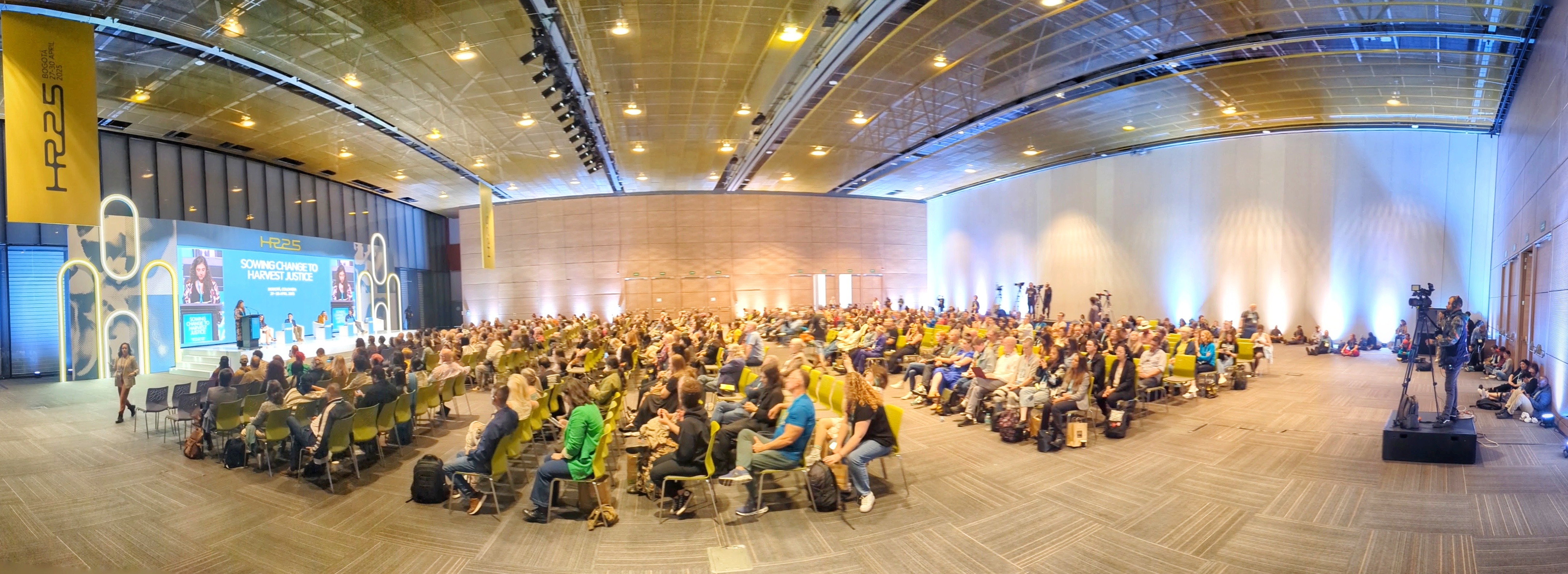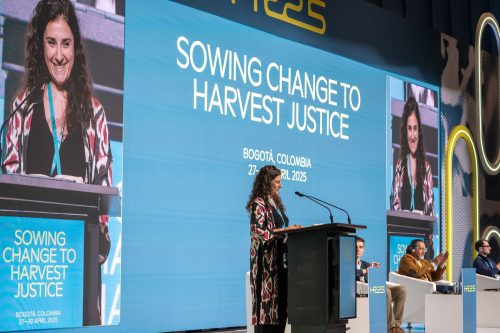18th June 2025
This is a transcript of the closing plenary speech by Michelle Wazan at the HRI25 conference in Bogota in May. A video is available below.
Good afternoon everyone, My name is Michelle Wazan and I work for Skoun, a harm reduction center operating in Lebanon.
It’s an honor to be standing here today.
Maddie [from HR] asked me to come here today and speak of my experience going through crisis and maybe share some good practices on how to best navigate it. As a I come from Lebanon, a country having gone through multiple crises and which has most recently become a war zone, and I am here standing before you, seemingly still alive; you would think I have it all figured out. Well, I don’t.
I’ve been fortunate enough to have a very helpful body, one that has developed a great trauma response, which is a form of narcolepsy, which has allowed me to instantly fall asleep at the sound or the news of airstrikes, and that basically
allowed me to sleep through the war. That’s a skill I wish I could teach you. But I cannot.
These past few days have reminded me that crisis is relative and that it is personal. But I cannot talk of crisis without mentioning the most extreme forms of violence like the genocide and extermination of the Palestinian people that is happening
right before our eyes; or the war in my country, Lebanon, that is killing, maiming and displacing men, women and children.

Crisis is the toxic drug supply that is devastating North America, and devastating Indigenous communities.
Crisis can be going through homelessness, hunger and poverty.
Crisis can be going through the death and loss of a loved one.
Crisis is the execution of human beings in the implementation of the death penalty, or the killing of human beings in the name of the war on drugs.
Crisis is climate change and environmental damage. It is dried up rivers, loss of habitat, it is stolen lands, and violated bodies.
Crisis can look like the funding cuts we’re all going through. It can also be shortage of essential medication.
Crisis can look like arrest, like arbitrary detention, like deportation, like hate crimes.
Crisis is being denied your dignity or humanity, it can be being denied gender affirming surgery after years of waiting, or not being able to correct your gender markers on official documentation.
Crisis can also look like losing your job, a break up, a divorce, or reaching your 40s and going through the dreaded, yet somewhat exciting midlife crisis.
But I have no words of wisdom to offer.
Coming from a warzone, I can easily recognize that we are at war.
We are at war against hatred, dogma, transphobia, fascism, oppression, racism, homophobia, colonialism, capitalism, extractivism, carceralism and the patriarchy.
We are at war, and we have been at war for decades.
But we are also the resistance. Whatever that may look like for each of us. It is our duty to resist and continue resisting. Our duty to continue speaking truth to power, to continue fighting obscurantism, to continue leading with community-based and community-led evidence, ancestral knowledge, compassion, care and as Aura Roig has put it with “radical tenderness.”
I have cried a lot this week, reflecting on the past years- that now feel like a decade- we’ve been going through in Lebanon. I’ve cried incessantly through Kokila, Luz Mery and Beatriz’s speeches and interventions.
I have cried – and mind you I’m not a crier- inspired, but mostly humbled by the kindness, creativity, strength and courage of each and every one of you.
This community, the people I don’t know personally but whose work I admire, those of you working in the shadows, those working under the table those of you I cannot wait to see and hug every year or so; Those of you whose faces I know but names I cannot remember – another trauma response; Those who stand by each other, elevate each other’s work, learn from each other, teach other, share resources and wealth; Now more than ever, this community, our solidarity matters.
We must continue fighting back, we must also fight our own cynicism, our own pessimism and our own fears, and remember that this community has fought tougher battles, and even if it took years or decades, we have won so many of
them.
This conference being held here in Colombia is a testament to that.
I hope we can keep fighting and resisting together and that these crises will only be temporary and that in a couple of years we will look back and write case studies about them.
I salute and respect each and every one of you.
Muchas gracias
Header photo by Nigel Brunsdon. Panorama photo by Steve Rolles. Video by Drug Reporter




